-
-
- Advancement of the Professions Committee
- Standards Committee
- Audit and Risk Committee
- Education Committee
- Disciplinary Committee
- Charter Case Committee
- Preliminary Investigation Committee and Disciplinary Committee Liaison Committee
- Registration Committee
- Preliminary Investigation Committee
- Paper classification: some definitions
-
-
-
-
- About extra-mural studies (EMS)
- EMS requirements
- Information for vet students
- Information for EMS providers
- Information for vet schools
- Temporary EMS requirements
- Practice by students - regulations
- Health and safety on EMS placements
- EMS contacts and further guidance
- Extra-mural studies fit for the future
-
-
- Code of Professional Conduct for Veterinary Surgeons
- Code of Professional Conduct for Veterinary Nurses
- Contact the Advice Team
- XL Bully dog ban
- 'Under care' - guidance
- Advice on Schedule 3
- Controlled Drugs Guidance – A to Z
- Dealing with Difficult Situations webinar recordings
- FAQs – Common medicines pitfalls
- FAQs – Routine veterinary practice and clinical veterinary research
- FAQs – Advertising of practice names
- GDPR – RCVS information and Q&As
-
- Accrediting veterinary degrees
- Accrediting veterinary nursing qualifications
- Reasonable adjustments for student vets
- Health and disability in veterinary medicine study and practice
- The role of the veterinary schools and the RCVS
- Reasonable adjustments and the Equality Act 2010
- Reasonable adjustments and Day One Competences
- Examples of reasonable adjustments for vet students
- Annex
- Reasonable adjustments for student vets - summary
- Reasonable adjustments for student veterinary nurses
- Health and disability in veterinary nurse education and training
- Reasonable adjustments for students and the UK disability discrimination legislation
- Educational assessment of veterinary nurses
- Roles of key stakeholders in the application of reasonable adjustments
- Examples of reasonable adjustments for vet nurse students
- Embracing reasonable adjustments for student vet nurses - summary
- External review of the RCVS by ENQA
- Requirements for remote and online student assessments
New RCVS President says mentorship and respect are key to navigating difficult paths ahead
9 July 2025
As he was inaugurated as the 149th President of the Royal College of Veterinary Surgeons (RCVS), Professor Tim Parkin FRCVS outlined his vision for how mentorship and respectful, constructive dialogue would help the regulator, and the veterinary professions as a whole, deal with some of the challenges ahead.
His remarks were made at Royal College Day 2025 – the Annual General Meeting and awards ceremony of the RCVS – which took place on Friday 4 July at One Great George Street in Westminster.
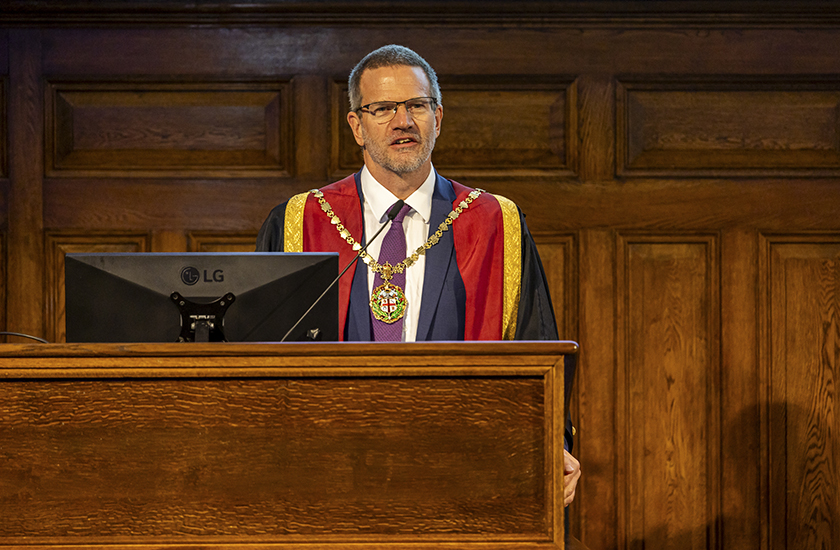 Speaking of his ‘requests’ for the professions for the year ahead, Tim (pictured) said: “Find a route to mentorship – pass on ‘your good’ to those who aspire to follow. We can all play our part in doing that – whether that be through chatting to school kids about the myriad of options available in our professions or more formally through work with veterinary schools or via VetGDP. Please reflect on how each of us can inspire and influence those who will do better than us in the future.
Speaking of his ‘requests’ for the professions for the year ahead, Tim (pictured) said: “Find a route to mentorship – pass on ‘your good’ to those who aspire to follow. We can all play our part in doing that – whether that be through chatting to school kids about the myriad of options available in our professions or more formally through work with veterinary schools or via VetGDP. Please reflect on how each of us can inspire and influence those who will do better than us in the future.
“There are clearly some very big on-going challenges we face – from the CMA [Competition and Markets Authority] investigation and workforce issues through to pushing for a new Veterinary Surgeons Act.
“If we think, not more than 10 years ago: EU-Exit had not yet happened, Covid was not a word (for most of us at least) and hybrid working was difficult to make work – trying to get more than one person onto a Skype call seemed to be beyond most. Our working lives have changed enormously over that period, but it is clear that further change is on the near horizon.
“So, as these changes crystalise - my second request is to be respectful in all forms of dialogue. Our professions should be a no-tolerance zone for abusive or aggressive words or behaviour.
“There will be many discussions to be had over the next few years – in particular related to legislative reform and much of our direction of travel will be taking us away from the modus operandi of the last 50 years – but we all have to recognise the need for change and that none of us will get everything we want. Please do not shy away from engaging – but please do so in a manner that is respectful of those working on your behalf.”
Tim, who is also Head of School at the University of Bristol’s Veterinary School and a Professor of Epidemiology, joined RCVS Council as an appointee of the Veterinary Schools Council in 2021. Since becoming a member of Council, he has chaired both the Education Committee and the Registration Committee, as well as serving on the Fellowship Board and the CMA Working Group, amongst other appointments.
Tim is a Bristol alumnus, completing undergraduate degrees in both zoology and veterinary science before completing his PhD on the epidemiology of fractures in racehorses at the University of Liverpool in 2002. He moved to the Animal Health Trust in 2005 and then to the University of Glasgow as a Defra Veterinary Training and Research Initiative Senior Research Fellow in 2007.
Between 2015 and 2018, he was Head of the Division of Equine Clinical Science and Clinical Director of the Equine Hospital at the University of Glasgow, and was promoted to Professor of Veterinary Epidemiology in 2017. Since November 2020, he has been Head of Bristol Vet School and continues to work with horse-racing governing bodies to provide data-driven, evidence-based solutions to welfare issues.
A full transcript of Tim’s speech can be found on the website.
AGM
Royal College Day 2025 began with the AGM, where the Annual Report and Financial Statements for 2024 were formally approved and where the results of the 2025 RCVS Council and Veterinary Nurses Council elections were announced.
After the announcement of the results – new elected members Dr Sam Bescoby MRCVS, Paddy Gordon MRCVS and Dr Danielle Greenberg MRCVS were welcomed to their four-year terms on RCVS Council, as were newly-appointed lay member Jo Clift and VN Council-appointee Kirsty Young RVN.
Farewells were also said to retiring elected RCVS Council members Will Wilkinson MRCVS, Dr Louise Allum MRCVS and Dr Danny Chambers MRCVS, and retiring lay member Judith Worthington. Sue Howarth RVN also retired as a veterinary nurse member of RCVS Council, but remains an elected member of VN Council.
For VN Council, new elected members Bethan Pinhey RVN and Hannah Welsman RVN were welcomed for their three-year terms on the Council, while farewells were said to retiring elected members Jessica Beckett RVN and Holly Witchell RVN.
RCVS President Linda Belton MRCVS also bid farewell to Janice Shardlow, the outgoing Chair of the Audit & Risk Committee, and welcomed new committee member Naomi Nicholson.
A short meeting of RCVS Council was also convened to confirm the Presidential Team for 2025-26, with Professor Tim Parkin as President, Linda Belton as Senior Vice-President, Tim Hutchinson MRCVS as Junior Vice-President and the newly re-elected Tshidi Gardiner MRCVS as RCVS Treasurer.
CEO address
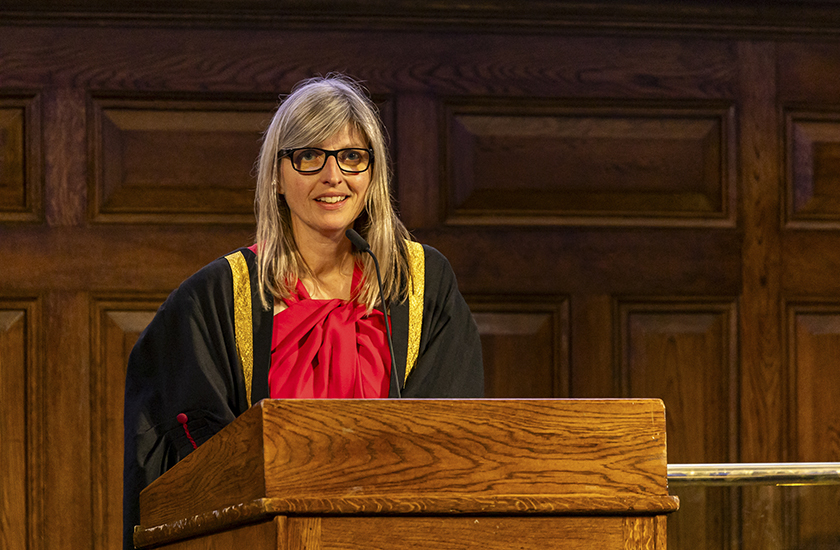 RCVS CEO Lizzie Lockett (pictured) then delivered her annual address, an overview of the presidential year from an operational point of view and a look to the year ahead, the first under the College’s new five-year strategy. She also presented images of the new RCVS headquarters, at Hardwick Street in London, and encouraged members to visit their College.
RCVS CEO Lizzie Lockett (pictured) then delivered her annual address, an overview of the presidential year from an operational point of view and a look to the year ahead, the first under the College’s new five-year strategy. She also presented images of the new RCVS headquarters, at Hardwick Street in London, and encouraged members to visit their College.
In her address (which can be read in full on the website) Lizzie said: “Taking its inspiration from our motto of 1844 – vis unita fortior – we are stronger together – the new plan recognises our unique role as a royal college that regulates, and the ability that gives us to work in a holistic way. To make sure that veterinary professionals are fit to practise and the veterinary professions are fit for purpose.
“This special role gives us the opportunity to hold the space – figuratively and now physically - for conversations not just about setting and maintaining veterinary standards, but also around the role of veterinary professionals in one health, societal expectations of professionals, career development and satisfaction, and working culture.
“And while there are organisations to support veterinary professionals, and there are those to support consumer interests, we are the only one with the ability to bring all sides together, in the interests of animal health and welfare, and public health.”
Honours and awards
Following a lunch break, Royal College Day moved on to its awards ceremony, where the recipients of RCVS and RCVS Knowledge awards had the opportunity to formally receive their accolades.
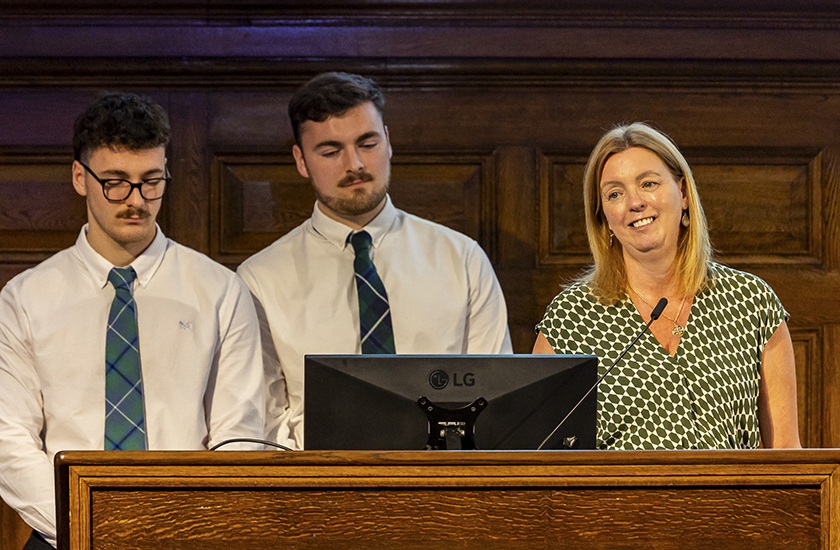 Among those being honoured was the late Professor Simon Doherty, who posthumously received the RCVS Queen’s Medal, the highest honour that can be bestowed upon an individual veterinary surgeon who has achieved a highly distinguished career with sustained and outstanding achievements throughout.
Among those being honoured was the late Professor Simon Doherty, who posthumously received the RCVS Queen’s Medal, the highest honour that can be bestowed upon an individual veterinary surgeon who has achieved a highly distinguished career with sustained and outstanding achievements throughout.
Simon died in December 2024 after a short battle with cancer and his widow Anne, along with his sons Callum and Lewis (pictured), came on stage to accept the award on his behalf.
In accepting the award, Anne spoke about her husband’s love of being a veterinary surgeon, and his dedication to the professions and to animal health and welfare on a global basis. She also praised the way the professions had rallied around Simon during his final days, with many visits, letters, emails and phone calls from friends, colleagues and acquaintances across the professions, saying it had been a great source of pride and comfort for Simon at the end of his life.
A full list of all of the RCVS and RCVS Knowledge award recipients can be found in the Royal College Day Programme.
VN Chair’s address
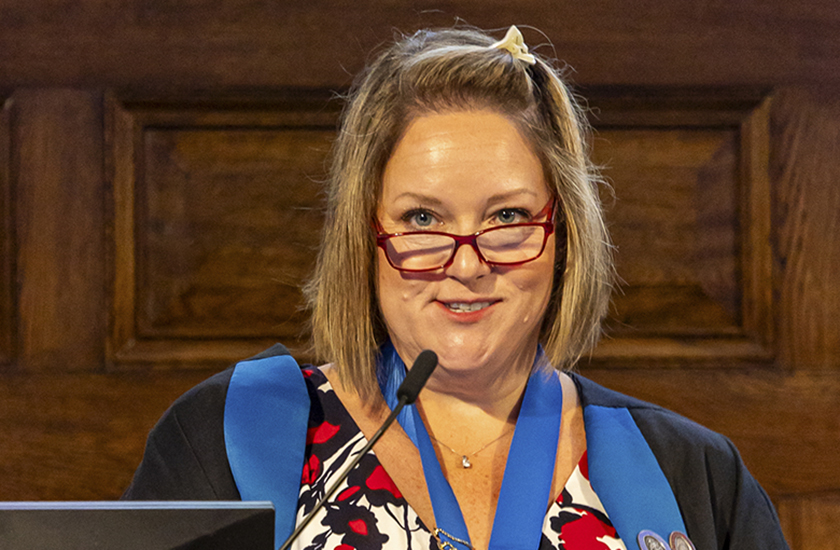 In her address to Royal College Day, the Chair of VN Council, Belinda Andrews-Jones (pictured), spoke about the fact that there seemed to be a momentum for change in veterinary nursing, with legislative reform seeming ever closer, and the CMA investigation highlighting the critical role of the VN.
In her address to Royal College Day, the Chair of VN Council, Belinda Andrews-Jones (pictured), spoke about the fact that there seemed to be a momentum for change in veterinary nursing, with legislative reform seeming ever closer, and the CMA investigation highlighting the critical role of the VN.
On the subject of what legislative reform would mean for VNs, she said: “It means a future where our profession is less limited, more empowered, and better recognised for the essential and complex roles we already play. We’re aiming for reforms that will make the scope of the VN role a matter for the RCVS as a regulator, no longer restricted by Schedule 3 – giving the RCVS the agility to evolve the profession as times and needs change.
“We’re also pushing for broader structural reform – like decoupling delegation from employment – to give VNs more freedom to work with practices, not just for them. This flexibility would benefit animal welfare, clients, and the whole veterinary team.
“Another important area is the protection of the title 'Veterinary Nurse'. which would be a huge step forward for both professional identity and public assurance.”
She encouraged veterinary nurses to remain engaged with the legislative reform process and to respond to any forthcoming consultations – for example, from the Department for Environment, Food & Rural Affairs – and continue to make their views on how VNs could be enhanced and empowered known.
Belinda's speech is available to read in full.
President’s address
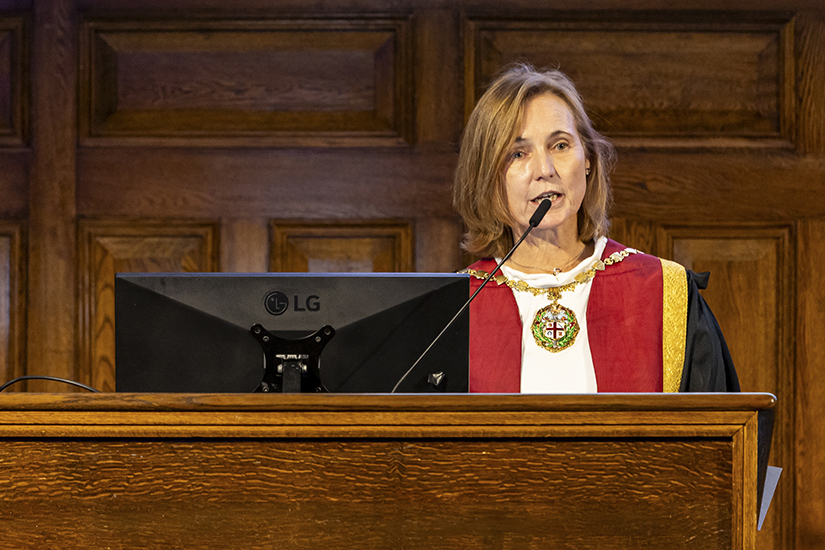 As the outgoing President of the RCVS, Linda Belton (pictured) gave her formal address to Royal College Day.
As the outgoing President of the RCVS, Linda Belton (pictured) gave her formal address to Royal College Day.
She said that the experience of her presidential year cemented her view that the veterinary voice needed to be central, saying: “We need, as a profession as well as individuals, to ensure we remain at the heart of decision-making around how veterinary care and services are delivered on the ground across the UK.
“The veterinary voice is a wise one – with a deep understanding of the complex world of animal health and welfare and also the animal human interaction which influences this.
“Ours is not a world of work where purely transactional relationships are likely to produce the best outcomes. We also work in a world where delivering value is important.
“Whilst we may be viewed by animal owners and keepers as an essential service, we provide this service in a commercial environment. It is incumbent upon us to understand the economics of the delivery of veterinary care such that we are well informed and can make good value professional judgements in the context of the needs of the animals and their owners and keepers.”
In her address she also highlighted the issue of trust and the fact that, despite some negative headlines during the year about the veterinary professions, levels of public trust remained high and that this was a precious commodity.
She said: “High levels of public trust in the veterinary professions are something precious, which we should value, defend and seek to build on further. It is integral to allowing us to do our work well and to enhance animal health and welfare.
“We all have a contribution to make, not just in holding each other to account but also the systems and processes under which we work. It is difficult, and arguably impossible, to do so alone.
“However, together we can support our professions to not only have individuals fit for practise, but professions fit for purpose that meet the needs of today’s society and the animals we care for and does so in a sustainable way for both the people working to deliver veterinary care and services and for the wider environment.”
Linda’s speech is available to read in full on the website.
Before Tim was formally invested as RCVS President following Linda’s speech, Linda first paid tribute to the outgoing Senior Vice-President Dr Sue Paterson FRCVS, who was President in 2023-24. She praised her energy and also the fervour she brought to some of her key areas of interest such as widening access, the environment and sustainability, and antimicrobial resistance.
After he was invested as President, Tim’s first formal duty was to thank Linda for her stewardship of the office for the past year, while also welcoming Tim Hutchinson as Junior Vice-President.
Guest speaker
To close Royal College Day, Linda Belton, as outgoing President, introduced her guest speaker – Dr Klara Saville MRCVS, Veterinary Head of Exotic Diseases at the Animal and Plant Health Agency (APHA) and founder of the international coalition Action for Animal Health – for her talk ‘The power of One Health; a global perspective on the role of vets in animal health, pandemic prevention and AMR’.
In her speech Klara spoke about her experience working in the developing world and how this gave her a perspective on the important role that veterinary professionals could play in reducing the burden of animal disease and the ancillary benefits this had on human health as well as the economy and society. She outlined some of the challenges, particularly in the developing world where there were acute shortages in veterinary professionals and veterinary medicines, but how charities and organisations were working to train more staff and improve access to medicines and vaccines.
Regarding disease prevention, she spoke about the APHA’s role as an emergency service that had to rapidly react to and coordinate responses to notifiable diseases, and how, when 75% of emerging human diseases were zoonotic in origin, this was crucial for overall public health.
However, she said that veterinary public health, on a global basis, suffered from chronic underinvestment and the risk of uncontrolled animal epidemics turning into zoonoses was why she founded Action for Animal Health in 2020, which was launched at the UK Houses of Parliament as a coalition of 14 voluntary organisations working in the One Health field.
She said that the group’s collective lobbying had already impacted international policy, as the World Health Organisation’s pandemic agreement contained a binding commitment to One Health and recognised the importance of animal health systems.